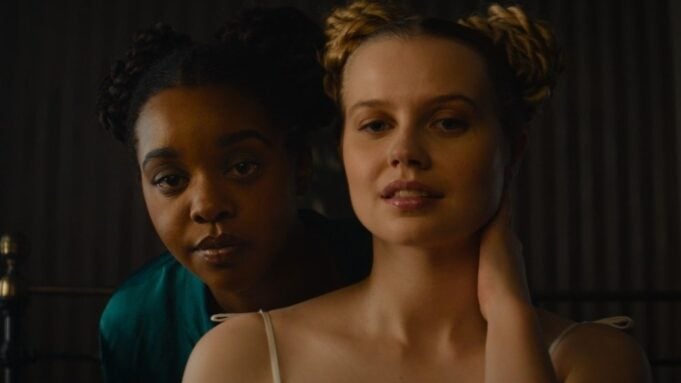“Steal Away” starts with intertitles that announce it as a tale of “two princesses.” The implied fairy tale trappings are appropriate for this metaphor heavy film. Director Clement Virgo adapts, with Tamara Faith Berger, the nonfiction novel “Steal Away Home” by Karolyn Smardz Frost. The book explored the relationship between an escaped slave and her mistress, whom she met when they were both young girls. Virgo’s film takes that premise and reimagines it as a twisty psychological allegory, laden with weighty themes. But “Steal Away” proves more rewarding to decipher afterward than to sit through.
Without establishing time or geographic setting, the film follows Cecile (Mallori Johnson), a young woman from the Congo who flees war in her home country and arrives as a refugee taken in by a white family who live in a strange big mansion. There she becomes the companion of Fanny (Angourie Rice), a girl her age who appears extremely naive in contrast. Cecile is worldly and has seen her share of sorrow, while Fanny has been cloistered in this elaborate old castle under the watchful eye of an over-protective mother and eccentric grandmother. The differences between Cecile and Fanny, in race and in maturity, become the reason they are both fascinated and repelled by each other.
As Fanny starts imitating Cecile — wearing her clothes, picking up her mannerisms — the film recalls movies of double personalities like “Persona” or even the more schlocky “Single White Female” — only here with added racial undertones. When Fanny wears Cecile’s Afro futuristic costumes, the themes explored encompass cultural appropriation. The film wisely lets the audience take in these topics and does not push into them with obvious dialogue.
But “Steal Away” never builds a true psychological conflict between its two leads. Cecile starts a steamy relationship with the mansion’s gardener’s son (Idrissa Sanogo Bamba) whom Fanny had eyes for. So all these considerable themes the film was trying to explore end up adding up to little more than a rudimentary sexual jealousy plot.
There are other more successful elements in the world-building of this fantasy land, which bears resemblance to several historical realities. The film could be argued as being set in a small European country in the mid 20th century, or in the contemporary American South, or even a futuristic yet unknown place. The political, social and racial mores of this place are in tandem with the current migration crisis attitudes in North America and Europe. There are visual motives and African costumes that hint at themes of colonization and cultural appropriation.
However, hinting is all that “Steal Away” does. It remains elusive, never confronting any of these themes head on. There is a difference between trying to start a conversation by not stating the obvious and staying so opaque that a dialogue never even starts. “Steal Away” leans towards the latter. Johnson has an earthy screen presence that contrasts well with Rice’s ice princess ingenue. The actors are able to bring life to the abstract dialogue while building believable tension and affection between their characters. Johnson’s character has more to do, thus she remains intriguing throughout; Fanny is not given much of an arc, so Rice has to keep repeating the same notes.
In the end, “Steal Away” feels incomplete: an assemblage of evocative ideas and images that never cohere to a resonant dramatic narrative. Virgo and Berger gesture at their themes rather than fully exploring them. Perhaps most egregiously, they give up in the end and fully explain the film’s metaphorical mystery. It’s unforgivable for a film whose most ambitious element to that point was keeping the audience guessing. Still a mood lingers, one of dislocation and unease. “Steal Away” occupies a peculiar place: too elusive to satisfy as narrative, too suggestive to dismiss as mere ornament — and ultimately too obvious to take seriously as an exploration of the tumultuous political and socioeconomic present.
Love Film & TV?
Get your daily dose of everything happening in music, film and TV in Australia and abroad.
From Variety US































